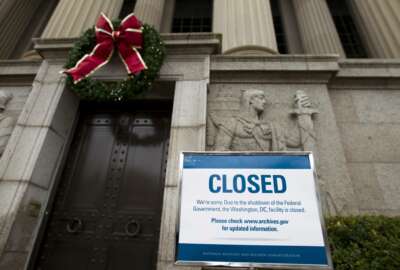

Evidence that many feds live paycheck-to-paycheck is not merely anecdotal.
My grandfather owned a small grocery store in Southeast D.C. You could buy single cigarettes for a penny-a-piece. During the Great Depression years, he, like many shopkeepers, extended short-term credit to the cash poor. Pretty much everyone was poor, and some would run out of money occasionally.
In this enduring partial government shutdown, most of the 800,000 unpaid employees aren’t poor in the classical sense. But many of them are cash poor. For the duration, there’s no difference. It’s gratifying to hear stories of institutions — including lenders — willing to cut unpaid federal employees some slack. Even the Washington Nationals offered payment delays to season plan holders who are on furlough or working unpaid. That’s a big deal. I mean, the average sports team owner would rather forego a championship than let go of a free hot dog.
Feds aren’t the first group of people to suffer thus. Layoffs and furloughs have been part of business and industry forever. But for a variety of reasons, the plight of federal employees has caught the media’s imagination. One reason is that excepted federal employees are unique in having to work on only the promise of pay. That’s illegal for everyone besides the federal government.
I think it was Moses who first let people know that, no, you can’t withhold an employee’s wages until tomorrow morning.
Still, on average, unpaid federal employees can take heart in findings from a study of the 2013 shutdown, which lasted 16 days. Here’s what academic economists working for the National Bureau of Economic Research (and funded by Intuit) found. That shutdown “produced a significant, temporary, and easily identified negative shock to the liquidity of a large number of affected government workers.” A negative shock to liquidity means you’re running low on or out of money.
But it also found that for the bulk of federal employees, the shock was reversed within two weeks of the vote restoring appropriations. The researchers call this a “pure shock” because it had a beginning and an end. It had no bearing on lifetime earnings. My own takeaway is, the temporary nature of the “liquidity shock” and the knowledge that it’ll be reversed means it lacks the long-term danger of a permanent layoff, or some catastrophic health event.
That doesn’t make the pay interruption easy. Especially for those without a fat checkbook. The NBER study found, “Prior to the shutdown, the median worker … held an average liquid assets balance sufficient to cover just eight days of average spending.”
Do lots of people live paycheck-to-paycheck — a notion some high officials have challenged? You betcha. The economists found “a substantial fraction of this population barely lives paycheck-to-paycheck. On the day before their paycheck arrives, the bottom third of the liquid assets distribution has, on average, a combined checking and savings account balance of zero.” Again, the study group was shut-down federal employees.
It turns out, according to the study, that employees with low liquidity to begin with find ways to manage. They obtain delays in mortgage payments. They freeze credit card spending. They delay other recurring payments that don’t incur penalties. People who did increase their credit card debt for the most part paid them off once they were paid.



In 2013, financially speaking, the shutdown ended almost before it began. Because of the timing of paychecks and Congressional action, most employees only lost four or five days of pay. They recovered that within two weeks.
This shutdown threatens to go much longer. So the complex calculations to predict employees’ behavior might not hold. The study shows federal employees are resilient. But when you’re the one in a situation demanding resiliency, though, it’s not much fun.
One thing that would help: The House must join the Senate in passing a back-pay bill and President Trump must sign it. That would help psychologically and maybe convince creditors to bend the parameters a little more.
Copyright © 2025 Federal News Network. All rights reserved. This website is not intended for users located within the European Economic Area.
Tom Temin is host of the Federal Drive and has been providing insight on federal technology and management issues for more than 30 years.
Follow @tteminWFED
